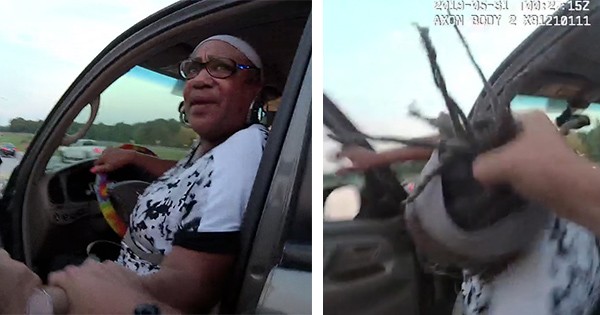
Nationwide — Stephanie Bottom, a 68-year old Black woman from Raleigh, North Carolina, has filed a lawsuit claiming that police officers used excessive force on her during a traffic stop two years ago that caused her severe injuries.In May 2019, Bottom was driving along Interstate 85 from the state of Georgia to Raleigh for a funeral when she was pulled over for alleged speeding and failing to heed blue lights flashing from the police car behind her.
According to the lawsuit against Salisbury Police Department and the Rowan County Sheriff’s Office, Bottom, who was then 66-years old, did not know she was going about 10 mph more than the speed limit.
The lawsuit said she was listening to music loudly in her car at that time and she did not immediately realize she was being pulled over. She then looked for a safe place to pull over until spike strips were deployed to stop her.
Police officers then approached her with guns drawn and grabbed her by her arm and hair, pulling her out of her car and throwing her onto the ground. Officers forced her to lay face down on the ground and twisted her arm behind her back, causing her “shoulder to ‘pop,’ tearing her rotator cuff and causing severe injury,” the lawsuit said, according to CNN.
Her requests for medical assistance were ignored even though she said she was in pain. Instead, she was handcuffed and the officers searched her car and purse without consent, warrant, or probable cause, which violated Bottom’s Fourth Amendment rights, according to the lawsuit.
One of the officers was heard bragging about grabbing a “handful of dreads,” saying “at that point she earned it” on body camera footage.
When she was asked to stand but couldn’t because of the pain in her shoulder, officers forcefully picked her up by her arms, inflicting more injury to her shoulder. She received medical attention only after about an hour. She had to undergo surgery but it did not fully repair her shoulder and it now has permanent damage, the lawsuit stated.
Bottom was charged with speeding and resisting arrest. She pleaded guilty to failure to heed blue lights and the other charges against her were dismissed.
Meanwhile, the Salisbury Police Department did not comment on the pending litigation but stated that it “strives for positive interactions with our residents and visitors, including in cases where we may suspect criminal activity.”
